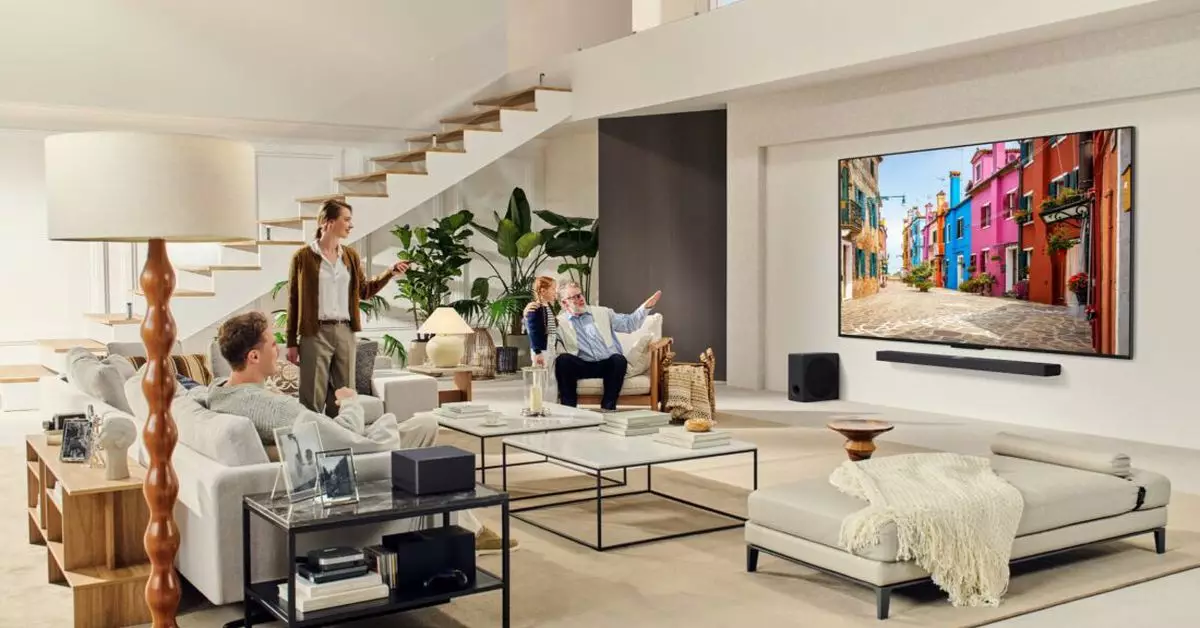In the dynamic realm of home entertainment, innovation often comes with high expectations, particularly at prominent tech showcases like CES. One standout example this year is LG, a brand synonymous with cutting-edge technology, particularly in the realm of televisions. The unveiling of the Zero Connect Box for the M Series OLED TVs is stirring curiosity, and now LG is setting its sights on its QNED Evo Mini LED lineup, signifying a potential shift in how we perceive and experience viewing content at home.
The Zero Connect Box is a significant development in display technology, designed to remove the clutter of traditional wiring while delivering premium audio and video directly to the television. With its ability to transmit 4K video at an impressive 144Hz, the Zero Connect Box stands out as an innovative solution that may cater to both casual viewers and serious gamers. By only requiring a power cable, this technology promotes a clean, minimalist aesthetic that aligns well with modern home designs.
As one of the key features leading LG’s charge into the future, the Zero Connect Box symbolizes a broader trend toward wireless solutions in home entertainment. However, while the initial response from reviewers is positive, it remains to be seen if the average consumer is ready to embrace such changes. Will users prioritize aesthetics and convenience over traditional setups, or will the desire for reliability and simplicity in installations hold sway?
In addition to the Zero Connect advancements, LG is implementing a notable departure from its previous technologies. By moving away from quantum dots in favor of its proprietary Dynamic QNED Color Solution, LG aims to deliver a more vibrant and authentic color experience. This innovative approach promises to produce “pure colors” that mimic those found in everyday life, aiming to appeal to viewers seeking realistic visual experiences.
Yet, this transition raises questions about performance consistency and consumer acceptance. Will this technology be able to maintain the superior color quality that quantum dots offered, or will it fall short of expectations once put under scrutiny in various lighting conditions? Clarity and performance are critical to any technology that promises to enhance picture quality, and LG must deliver on this prowess if it hopes to build consumer trust.
One of the most provocative changes in LG’s forthcoming QNED Evo lineup is the introduction of AI capabilities via a new button on the Magic Remote. By replacing the traditional input button, LG aims to enhance user experience with AI-driven features that allow for personalized viewing recommendations and content searches prompted by contextual queries. This ambitious move reflects an emerging trend where artificial intelligence is becoming central to consumer electronics.
However, this development raises fundamental questions about user desire and functionality. Do viewers genuinely want an AI that recommends content based on artificial intelligence analyses, or do they prefer to curate their viewing experiences manually? While many tech enthusiasts may appreciate the novelty of AI integration, a sizeable segment may remain skeptical or even resistant to ceding control to an automated system.
Moreover, LG’s assertions regarding AI-driven enhancements to audio—upscaling, fine-tuned HDR, and improved voice clarity—pose another layer of intrigue. These features promise to resolve long-standing issues in home viewing, such as ambient noise clashing with dialogue. However, past experiences suggest that marketing claims can often outpace practical results. LG will need to substantiate its ambitions with evidence of tangible improvements before the marketplace can fully embrace these advancements.
As LG positions itself at the forefront of television innovation, the anticipation surrounding the pricing and release of the 2025 QNED Evo lineup remains palpable. Historically, CES announcements are filled with tantalizing previews, but questions of affordability linger long into the product lifecycle.
Ultimately, LG’s ability to blend cutting-edge technology with consumer preferences will determine its success. While the innovation promises to elevate home viewing experiences, practical considerations, such as affordability and user-friendliness, will weigh heavily on consumer acceptance. The next chapter in home entertainment is unfolding, but it requires careful navigation if LG aims to meet the high expectations set by the tech community. By balancing ambition with reality, LG may lead the way towards a new era in home entertainment.

